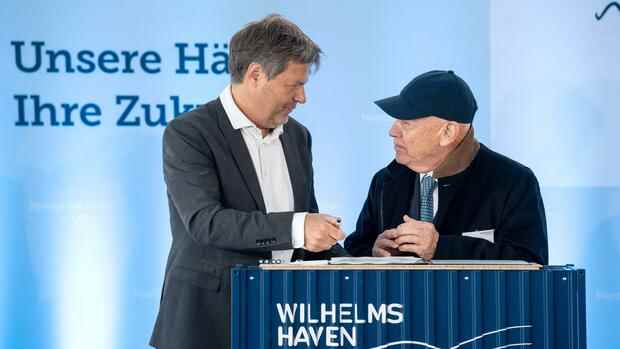Germany’s Economics Minister and the Greek shipowner signing the contract for the floating liquid gas terminals.
(Photo: dpa)
Athens The gas tanker “Transgas Power” is currently en route in the Pacific from Sendai in Japan to Freeport in the US state of Texas. The sister ship “Transgas Force” is meanwhile sailing from Trinidad and Tobago in the direction of the North Atlantic. The ships belong to the Greek shipping company Dynagas. In the second half of the year they will set course for Germany.
The federal government chartered the tankers through the energy company Uniper. From next winter onwards, they are intended to make Germany more independent of Russian gas supplies as floating liquid gas terminals, known in technical jargon as Floating Storage and Regasification Units (FSRU).
“We are very pleased that these FSRUs will be installed in Germany and will provide the country with natural gas, which will ultimately also enable the transition to a lower-carbon future,” says George Prokopiou. The 76-year-old Greek is the founder and president of Dynagas.
When Prokopiou commissioned the two ships from the Chinese state shipyard Hudong-Zhonghua in 2016, nobody thought about the war in Ukraine and the energy crisis. The delivery in autumn 2021 already showed that the Greek had the right nose and good timing: With the gas prices, the charter rates for LNG tankers also went up. Within a few months, daily rates on the spot market rose from $50,000 to more than $300,000.
Top jobs of the day
Find the best jobs now and
be notified by email.
Together with two other FSRUs that Germany leases from the Norwegian shipping company Höegh LNG, Prokopious ships can feed up to 30 billion cubic meters of natural gas into the German grid every year. That would be almost two-thirds of the amount that Germany imported from Russia last year.
Greek tanker owners outnumbered
Greek shipowners recognized the growing importance of LNG for the gas market earlier than their competitors in other countries. Of the 640 LNG tankers currently sailing the world’s seas, 135 belong to Greek owners. Prokopious Dynagas controls 17 of them. Nine more are on order in Korea.
Lloyd’s List ranks Prokopiou twelfth in its list of the world’s most influential figures in the shipping industry. The tycoon likes to tell the story of how, as a six-year-old, he made a raft out of old planks on the beach in the Athens coastal suburb of Glyfada and paddled it out into the Saronic Gulf. “When I felt the waves, I knew what I wanted to be,” Prokopiou recalls.
He got his first real ship in 1972: with two partners, he bought the 55,000-ton tanker “Pennsylvania” from Getty Oil. Today, Prokopiou, through his companies Dynacom Tankers, Sea Traders, Dynagas and New York Stock Exchange-listed Dynagas LNG Partners, commands a fleet of more than 120 vessels valued at an estimated $2 billion.
“We risk our money at sea, but we invest on land,” says Prokopiou. According to media reports, he owns more than 2,000 properties in the Mediterranean, the United States and Great Britain. One of the pearls of his portfolio is Villa Christina in Portofino.
However, the shipowner prefers to live on the sea: he lives mostly on board his 106-metre yacht “Dream”, which is usually moored off the coast of Glyfada. His four daughters Ioanna, Marilena, Marina and Maria-Eleni work in the company.
Charter rates from $200,000 per day
Prokopiou is considered one of the most innovative Greek shipowners. It owns one of the world’s largest fleets of ice class 1A LNG carriers. They can break up ice up to 80 centimeters thick. Prokopiou also showed good instincts when ordering the two FSRUs. These ships, of which there are only 48 in the world, cost around $300 million. According to estimates from industry circles, charter rates are around $200,000 per day.
Chartering to Germany not only brings a good return, it is also a welcome diversification. So far, Prokopiou has been heavily dependent on business in Russia. He has chartered several vessels to Gazprom and Yamal LNG, which is owned by Nowatek, Russia’s largest private gas producer. Yamal uses the ice-breaking ships between the production areas in the Russian Arctic and the Far East.
Dynagas says it is not violating EU and US sanctions on Russia. So far, they have not been directed against gas transport. But that could change if the sanctions are expanded. Britain has already imposed a ban on ships chartered by Russian companies.
More: Up to half a trillion euros in damage from the energy embargo

